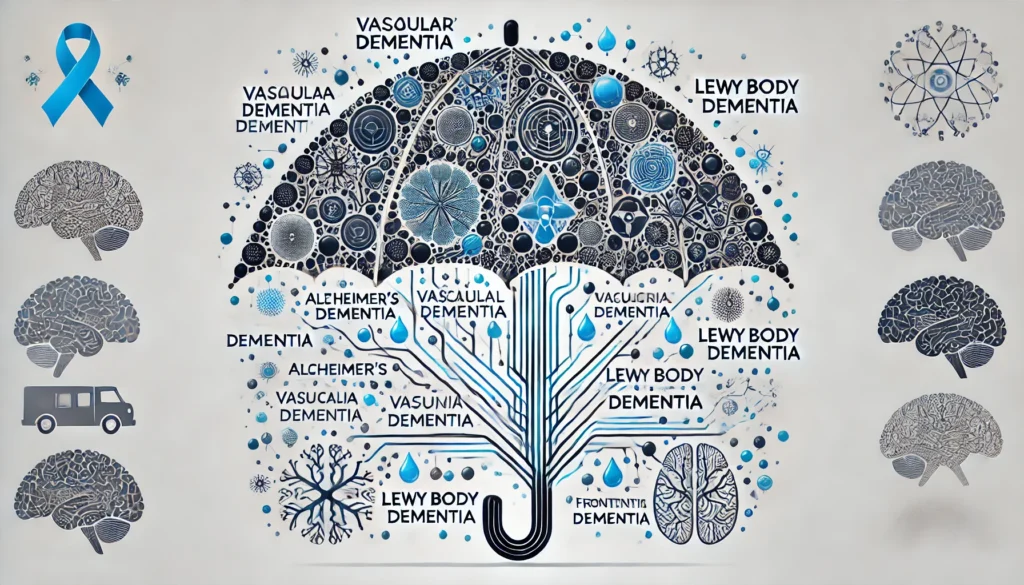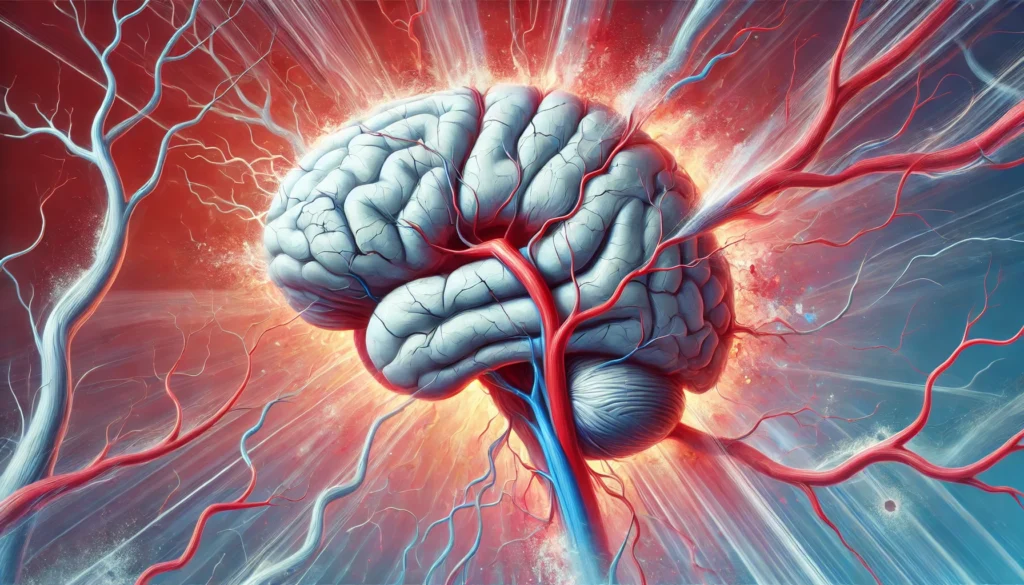Dementia is a general term used to describe a decline in cognitive function severe enough to interfere with daily life. It is not a single disease but an umbrella term covering a range of specific medical conditions, including Alzheimer’s disease. Disorders grouped under the general term “dementia” are caused by abnormal brain changes.
You may also like: Tips to Improve Low Average Memory Performance
The Umbrella of Dementia
Understanding dementia as an umbrella term is essential. It encompasses multiple disorders that result in cognitive impairment. This includes conditions such as Alzheimer’s disease, vascular dementia, Lewy body dementia, and frontotemporal dementia, among others. Each of these conditions manifests differently and has distinct causes, symptoms, and progression patterns.
Alzheimer’s Disease
Alzheimer’s disease is the most prevalent form of dementia and is characterized by the accumulation of amyloid plaques and tau tangles in the brain. These abnormalities lead to the death of brain cells and a progressive decline in cognitive abilities. Symptoms typically begin with mild memory loss and progress to severe impairment affecting language, reasoning, and behavior.
Vascular Dementia
Vascular dementia results from reduced blood flow to the brain, often due to stroke or small vessel disease. It is the second most common type of dementia. Symptoms can vary depending on the brain regions affected but often include problems with planning, organization, and decision-making. Unlike Alzheimer’s, memory loss may not be the initial symptom.
Lewy Body and Frontotemporal Dementia
Lewy body dementia is associated with abnormal protein deposits called Lewy bodies in the brain, leading to symptoms such as hallucinations, movement disorders, and cognitive fluctuations. Frontotemporal dementia primarily affects the frontal and temporal lobes, causing changes in personality, behavior, and language. Understanding these distinctions is crucial for accurate diagnosis and treatment.
Dementia vs Alzheimer’s
The terms “dementia” and “Alzheimer’s” are often used interchangeably, but they are not synonymous. Alzheimer’s disease is the most common form of dementia, accounting for approximately 60-80% of cases. While dementia describes a set of symptoms, Alzheimer’s refers to the specific disease that causes these symptoms.
Symptomatic Differences
While all types of dementia involve cognitive decline, the symptoms can differ significantly. For example, memory loss is a hallmark of Alzheimer’s, whereas in vascular dementia, cognitive difficulties may be more related to planning and judgment. Recognizing these differences is key for tailoring treatment and care strategies.
Progression and Prognosis
The progression of Alzheimer’s disease is typically gradual, spanning several years. In contrast, vascular dementia may progress in a stepwise manner, with sudden declines following strokes. Understanding the natural history of each type of dementia helps in setting realistic expectations and planning for future care needs.
Misconceptions and Public Understanding
There is a need to address common misconceptions about dementia and Alzheimer’s. Many people mistakenly believe that dementia is a normal part of aging, which can delay diagnosis and intervention. Public education efforts are essential in dispelling myths and promoting awareness of the early signs and symptoms.
Alternative Names and Terms for Dementia
In the medical field, terminology evolves as our understanding of diseases progresses. Here are some alternative names and terms for dementia:
Cognitive Impairment
Cognitive impairment is a broad term that can refer to mild memory problems to severe dementia. Mild Cognitive Impairment (MCI) is often considered a precursor to dementia, particularly Alzheimer’s disease. Individuals with MCI exhibit noticeable memory issues but can still perform everyday activities.
Mild Cognitive Impairment (MCI)
MCI represents a transitional stage between normal cognitive aging and dementia. Not everyone with MCI will develop dementia, but the risk is higher compared to those without MCI. Early recognition and monitoring of MCI can provide opportunities for interventions that may delay progression.

Cognitive Symptoms Spectrum
Cognitive impairment spans a spectrum from mild forgetfulness to complete dependency due to severe dementia. Understanding this spectrum helps in identifying where an individual may fall and what interventions may be appropriate. It also emphasizes the importance of personalized care plans.
Cognitive Reserve and Resilience
The concept of cognitive reserve suggests that individuals with a higher reserve can better cope with brain changes without showing clinical symptoms. Factors such as education, occupation, and engagement in mentally stimulating activities contribute to cognitive reserve, highlighting the importance of lifelong learning and brain health.
Neurocognitive Disorders
The Diagnostic and Statistical Manual of Mental Disorders (DSM-5) classifies dementia as a major neurocognitive disorder. This term highlights the neurological basis of dementia and aligns it with other cognitive disorders. It provides a framework for diagnosing and understanding the different types of dementia.
Major and Minor Neurocognitive Disorders
DSM-5 differentiates between major and minor neurocognitive disorders, with major disorders significantly impacting daily activities, while minor disorders involve a lesser degree of impairment. This classification aids in diagnosing the severity of cognitive decline and guides treatment decisions.
DSM-5 Criteria and Diagnosis
The DSM-5 criteria for neurocognitive disorders include evidence of cognitive decline in one or more domains (memory, language, executive function) and interference with independence in daily activities. Accurate diagnosis using these criteria is vital for appropriate management and support.
Neurocognitive Disorders in Research
Research into neurocognitive disorders focuses on understanding the underlying pathologies and developing targeted therapies. Advances in neuroimaging and biomarkers are paving the way for earlier and more accurate diagnosis, which is crucial for effective treatment.
Senility
Historically, the term “senility” was used to describe symptoms of dementia. However, this term is outdated and often considered derogatory. It implies that cognitive decline is an inevitable part of aging, which is not accurate. Dementia is not a normal aspect of aging; it is a result of specific diseases and conditions.
The Stigma of Senility
Using terms like “senility” contributes to the stigma surrounding dementia, deterring individuals from seeking help. It is important to shift the narrative towards understanding dementia as a medical condition that warrants attention and care, rather than an inevitable consequence of aging.
Language and Perception
Language shapes our perception of diseases, and terms like “senility” can perpetuate negative stereotypes. By using accurate and respectful terminology, we can improve public understanding and empathy towards those affected by dementia.
The Role of Public Education
Public education initiatives are crucial in correcting outdated views of dementia and promoting accurate knowledge about its causes and treatments. These efforts can empower individuals to seek early diagnosis and engage in preventive measures.
Symptoms and Diagnosis
Understanding the symptoms of dementia is crucial for early diagnosis and management. Symptoms can vary significantly depending on the type of dementia and the areas of the brain affected.
Common Symptoms
- Memory loss
- Difficulty communicating or finding words
- Difficulty with visual and spatial abilities
- Difficulty reasoning or problem-solving
- Changes in personality or behavior
Memory and Learning
Memory impairment is often one of the earliest signs of dementia, particularly in Alzheimer’s disease. This can manifest as forgetting recent events or conversations. Understanding the nuances of memory loss can aid in differentiating dementia from normal age-related memory changes.
Language and Communication
Difficulty finding words or following conversations can be frustrating for individuals with dementia and their families. These communication challenges often lead to social withdrawal. Early interventions, such as speech therapy, can help maintain communication skills and improve quality of life.
Visual-Spatial and Problem-Solving Skills
Dementia can affect an individual’s ability to navigate environments and solve everyday problems. This may result in disorientation and difficulty performing tasks that were once routine. Occupational therapy can provide strategies to enhance independence and safety.
Diagnosis
Diagnosing dementia involves a comprehensive evaluation, including medical history, physical examination, neurological tests, and cognitive assessments. Imaging tests such as MRI or CT scans can help identify brain changes indicative of dementia.
Comprehensive Evaluation
A thorough evaluation is essential for an accurate diagnosis. This includes gathering a detailed medical history and conducting a physical examination to rule out other causes of cognitive decline. This process ensures that individuals receive appropriate care and support.
Neurological and Cognitive Testing
Neurological tests assess reflexes, coordination, and sensory function, while cognitive assessments evaluate memory, attention, language, and problem-solving abilities. These tests provide valuable insights into the extent and nature of cognitive impairment.
Role of Brain Imaging
Imaging techniques such as MRI and CT scans can detect structural changes in the brain, such as atrophy or lesions. These findings, combined with clinical assessments, help confirm a diagnosis of dementia and guide treatment planning.
Current Trends and Future Implications
The study of dementia is continuously evolving. Researchers are exploring new diagnostic methods, treatments, and preventive measures. The growing understanding of genetics, environmental factors, and lifestyle choices offers hope for future breakthroughs.
Advances in Treatment
While there is currently no cure for most types of dementia, treatments are available to manage symptoms and improve quality of life. Advances in pharmacology and non-pharmacological interventions are providing new avenues for care.
Pharmacological Interventions
Medications such as cholinesterase inhibitors and memantine can help manage symptoms of Alzheimer’s disease. Research into disease-modifying therapies aims to slow disease progression, offering hope for more effective treatments in the future.
Non-Pharmacological Approaches
Non-drug interventions, including cognitive therapies, exercise, and social engagement, play a vital role in managing dementia. These approaches can enhance well-being and delay functional decline, highlighting the importance of a holistic care plan.
Personalized Medicine
The future of dementia treatment lies in personalized medicine, where therapies are tailored to an individual’s genetic makeup, lifestyle, and disease characteristics. This approach promises to improve outcomes and reduce the burden of dementia.

Prevention and Lifestyle Changes
Research suggests that certain lifestyle changes may reduce the risk of developing dementia. These include maintaining a healthy diet, regular physical activity, social engagement, and mental stimulation. Understanding these preventive measures is critical for health and wellness professionals, journalists, and biohackers alike.
Diet and Nutrition
A diet rich in fruits, vegetables, whole grains, and omega-3 fatty acids supports brain health. The Mediterranean and DASH diets, in particular, have been associated with a reduced risk of cognitive decline, underscoring the importance of nutrition in dementia prevention.
Physical Activity and Exercise
Regular physical activity promotes cardiovascular health and may protect against cognitive decline. Exercise increases blood flow to the brain and stimulates the release of neuroprotective factors, making it a crucial component of a dementia prevention strategy.
Social and Cognitive Engagement
Engaging in social activities and cognitively stimulating tasks, such as puzzles and reading, can enhance cognitive reserve and delay the onset of dementia symptoms. These activities provide mental challenges that are essential for maintaining brain health.
Practical Advice for Health and Wellness Professionals
For those in the health and wellness field, providing accurate and practical advice on dementia is essential. This involves staying informed about the latest research, understanding the nuances of different types of dementia, and offering supportive resources to clients and the public.
Educating Clients
Health and wellness coaches can play a vital role in educating clients about dementia. This includes discussing risk factors, preventive measures, and the importance of early diagnosis. Providing clients with reliable resources and support can empower them to make informed decisions about their health.
Risk Factors and Prevention
Educating clients about modifiable risk factors, such as smoking and hypertension, can encourage lifestyle changes that reduce dementia risk. Coaches can guide clients in adopting healthy habits that support long-term brain health.
Importance of Early Diagnosis
Early diagnosis of dementia allows for timely intervention and better management of symptoms. Educating clients on the early signs of dementia can facilitate prompt medical evaluation and access to support services.
Providing Resources and Support
Offering clients access to educational materials, support groups, and community resources can enhance their understanding of dementia and provide much-needed support for caregivers and families.
Translating Complex Information
For science journalists, translating complex medical information into engaging and understandable content is crucial. This involves breaking down scientific jargon, providing context, and highlighting the human impact of dementia.
Simplifying Medical Jargon
Journalists must distill complex scientific concepts into clear, accessible language. This involves using analogies and examples to explain technical terms, ensuring that the information is understandable to a broad audience.
Providing Context and Relevance
Contextualizing scientific findings within the broader landscape of dementia research helps readers understand their significance. Highlighting real-world implications and potential benefits of new discoveries can engage and inform the public.
Human Stories and Impact
Sharing personal stories of individuals affected by dementia can humanize the condition and foster empathy. These narratives illustrate the challenges and triumphs of living with dementia, making the science more relatable and compelling.
Biohacking and Brain Health
Biohackers interested in optimizing brain health can benefit from understanding dementia’s underlying mechanisms. Exploring the latest breakthroughs in brain science and nootropic supplements can provide insights into enhancing cognitive function and preventing cognitive decline.
Exploring Brain Science
Biohackers can delve into research on neuroplasticity, neurogenesis, and the role of neurotransmitters in cognitive function. Understanding these processes can inform strategies for enhancing brain health and resilience.
Nootropic Supplements
Nootropics, or cognitive enhancers, are gaining popularity for their potential to improve mental performance. Biohackers should critically evaluate the evidence supporting these supplements and consider their safety and efficacy in promoting cognitive health.
Personalized Biohacking Strategies
Developing personalized biohacking strategies involves tailoring interventions to individual needs and goals. This may include dietary modifications, exercise routines, and cognitive training exercises designed to optimize brain function.

Conclusion
Understanding the alternative names and terms for dementia is vital for anyone involved in health and wellness. By demystifying this complex condition, we can better support those affected and work towards a future where dementia is more manageable and, hopefully, preventable. Stay informed, stay compassionate, and continue to explore the fascinating world of brain health.
Continuing Education and Advocacy
Continued education in dementia research and advocacy for those affected are essential in driving progress. Professionals must stay abreast of new developments and advocate for policies that support dementia care and research.
Building a Supportive Community
Creating a supportive community involves fostering connections among individuals affected by dementia, caregivers, and health professionals. Sharing experiences and resources can empower those impacted and facilitate mutual support.
Hope for the Future
Ongoing research and innovation in dementia offer hope for better treatments and, ultimately, prevention. By understanding the current landscape and future possibilities, we can work together towards a world where dementia is no longer feared but effectively managed and understood.
Further Reading:
Alzheimer’s and dementia: What’s the difference?
The difference between Alzheimer’s disease and other dementias
Important Note: The information contained in this article is for general informational purposes only, and should not be construed as health or medical advice, nor is it intended to diagnose, prevent, treat, or cure any disease or health condition. Before embarking on any diet, fitness regimen, or program of nutritional supplementation, it is advisable to consult your healthcare professional in order to determine its safety and probable efficacy in terms of your individual state of health.
Regarding Nutritional Supplements Or Other Non-Prescription Health Products: If any nutritional supplements or other non-prescription health products are mentioned in the foregoing article, any claims or statements made about them have not been evaluated by the U.S. Food and Drug Administration, and such nutritional supplements or other health products are not intended to diagnose, treat, cure, or prevent any disease.


